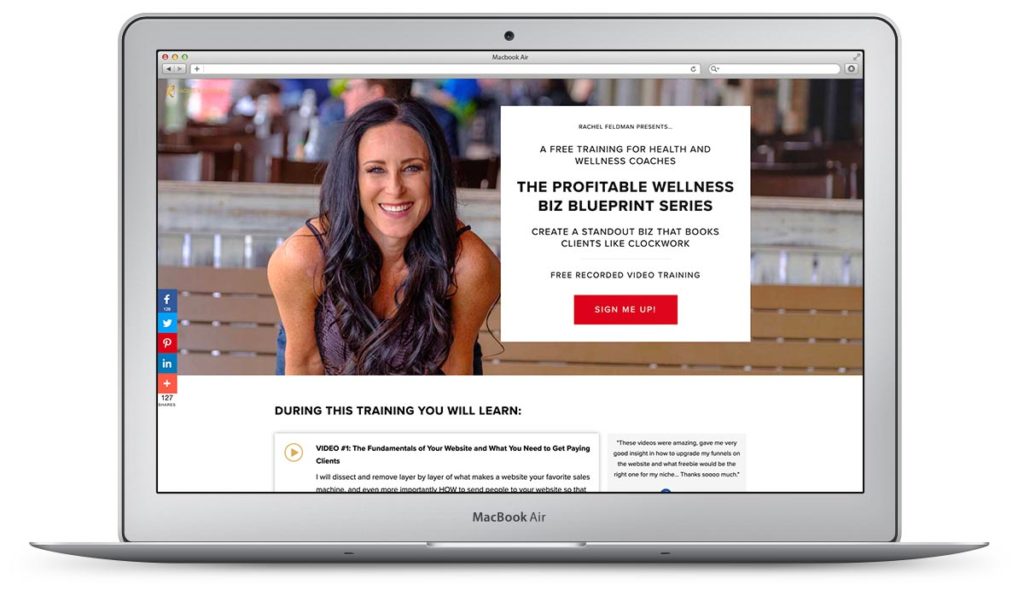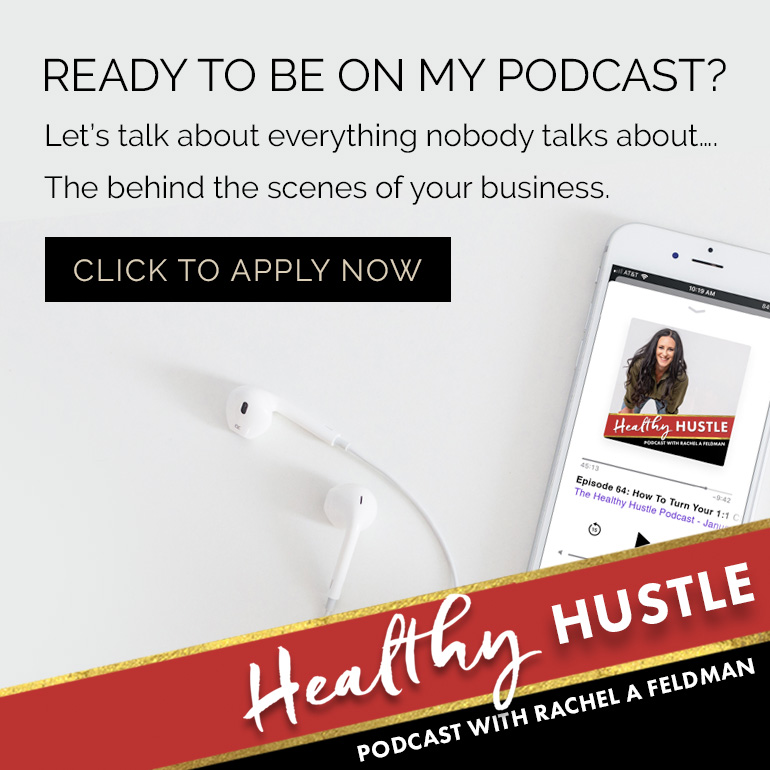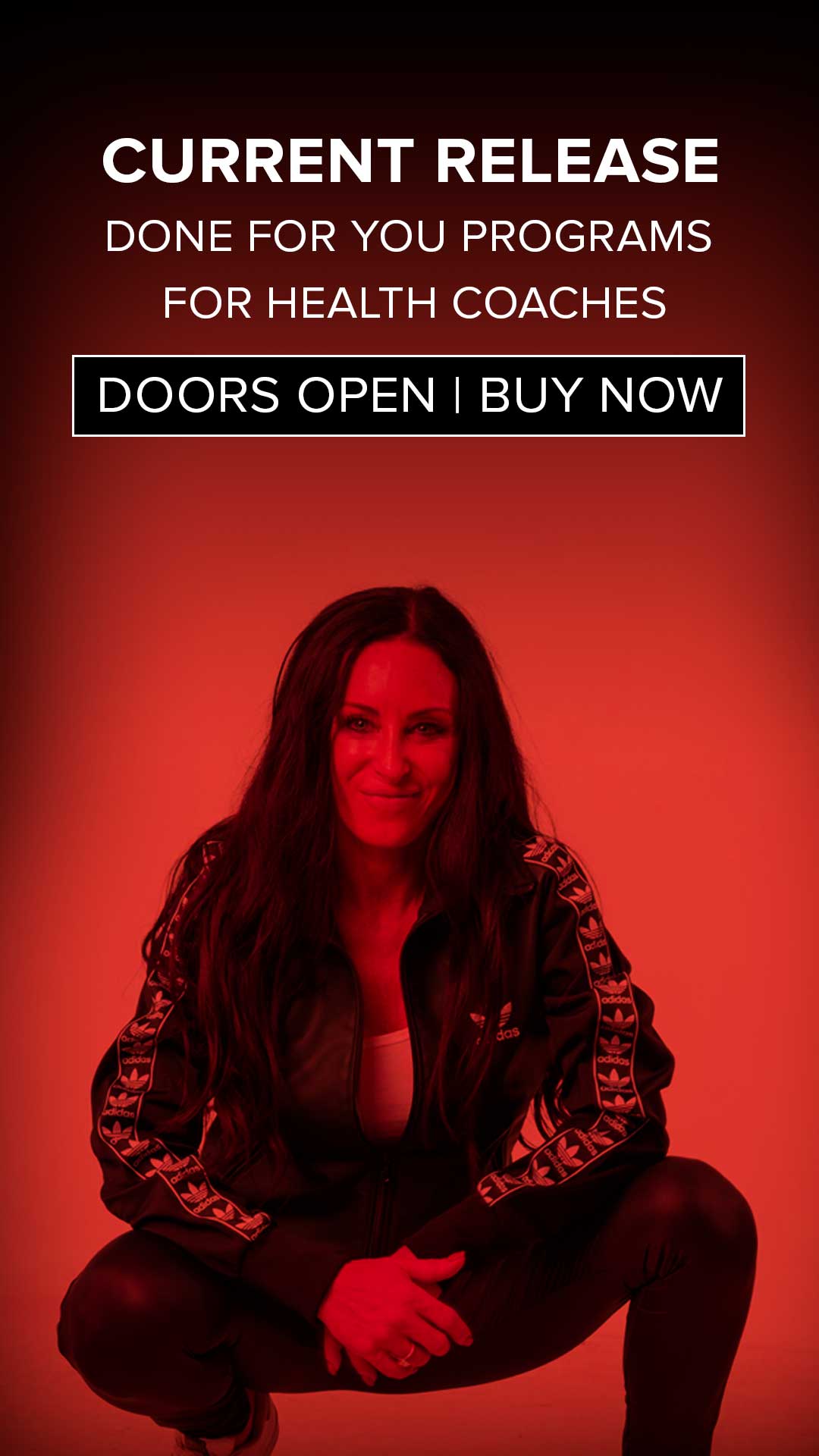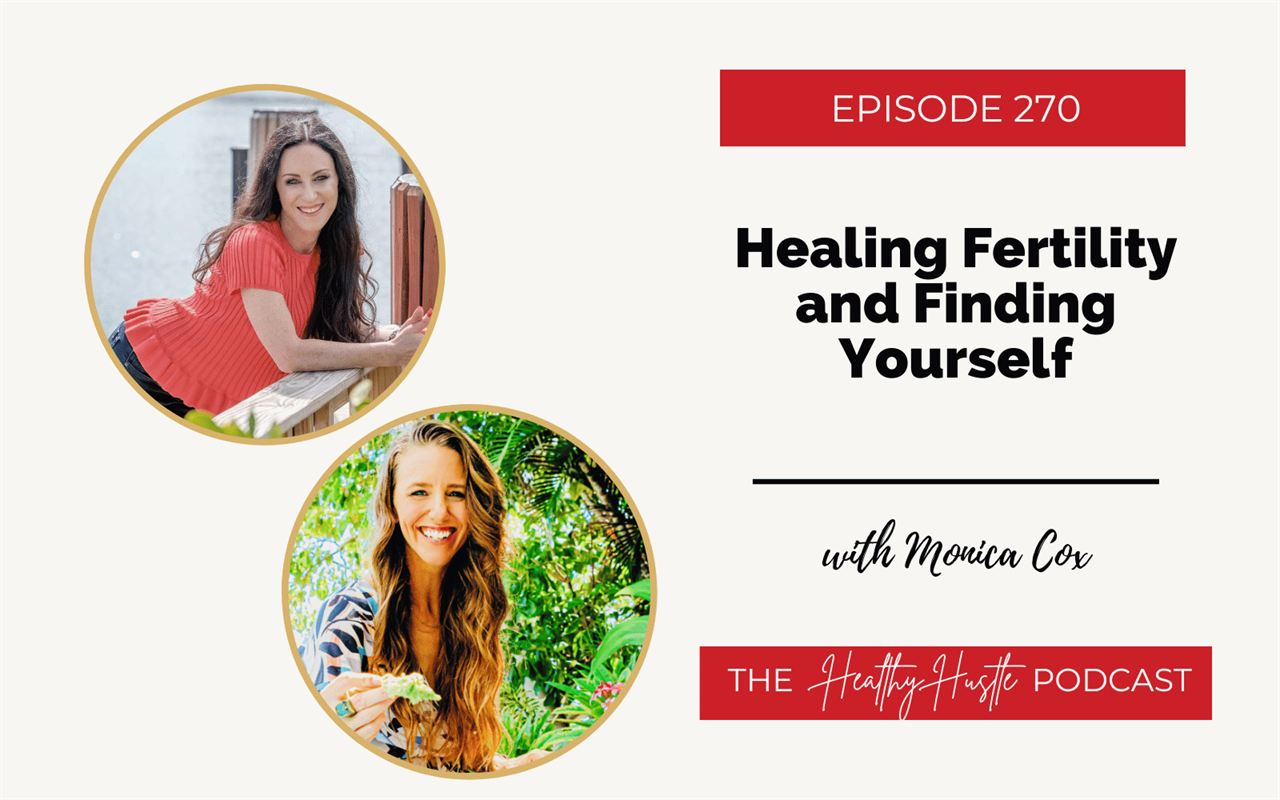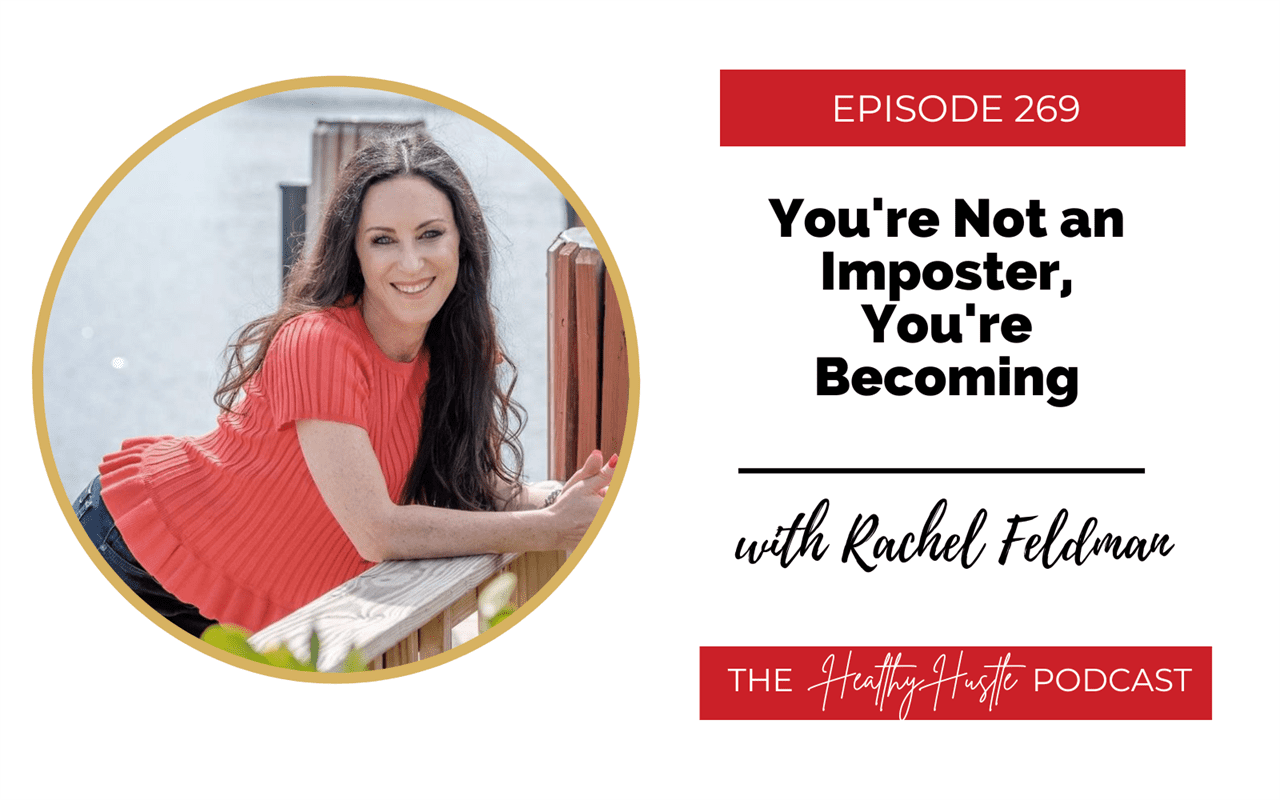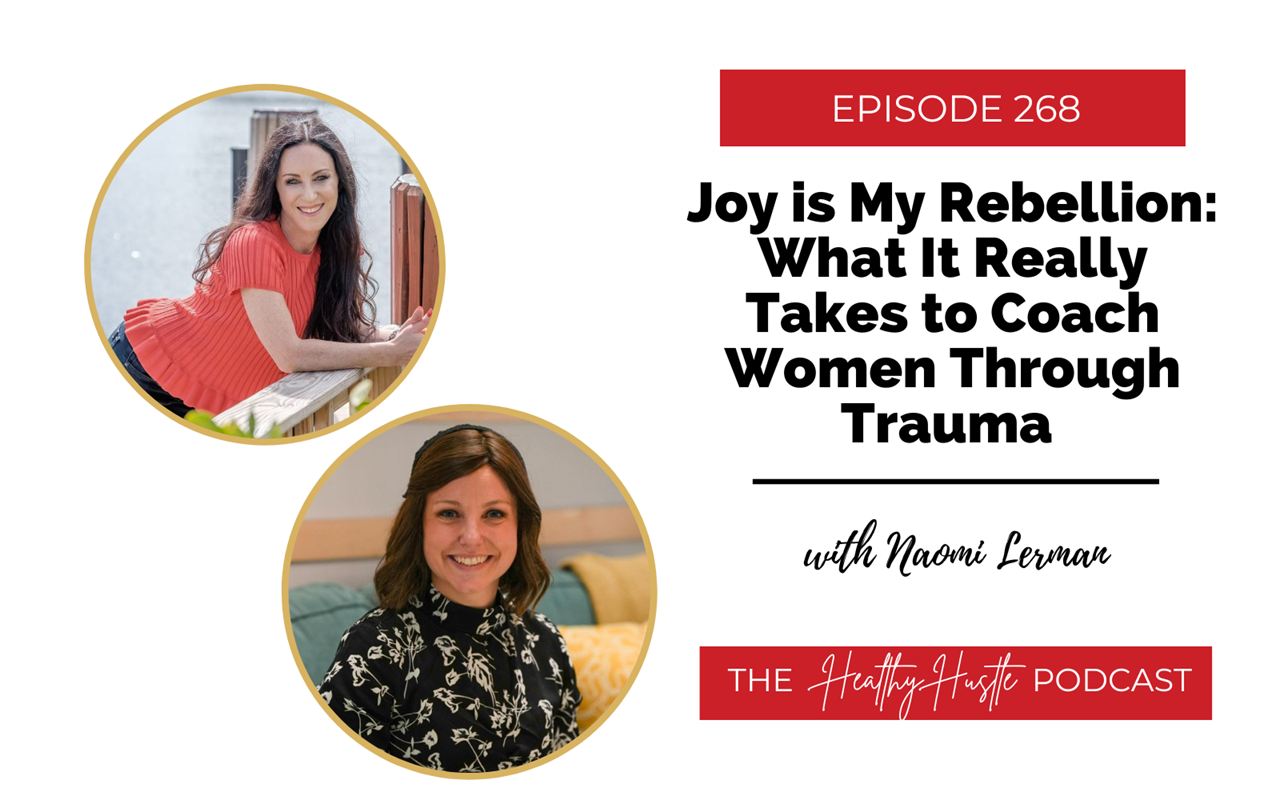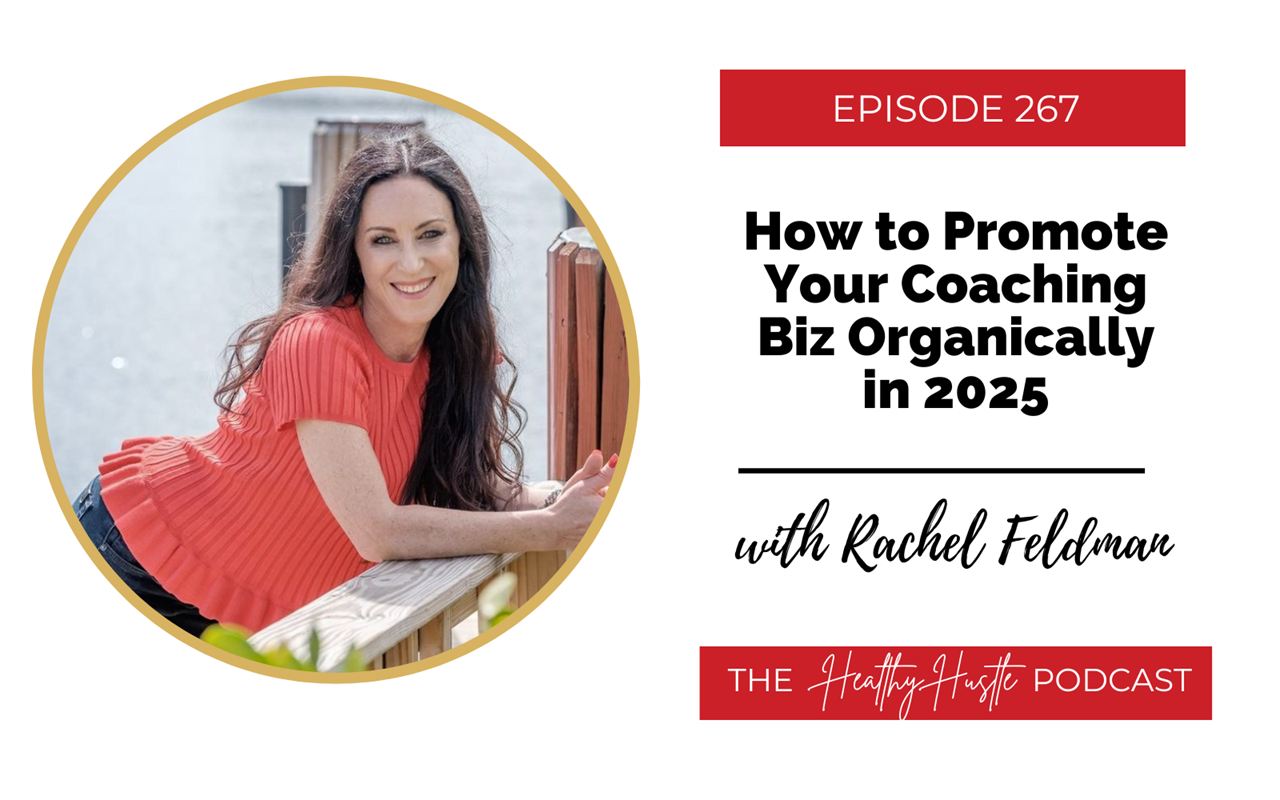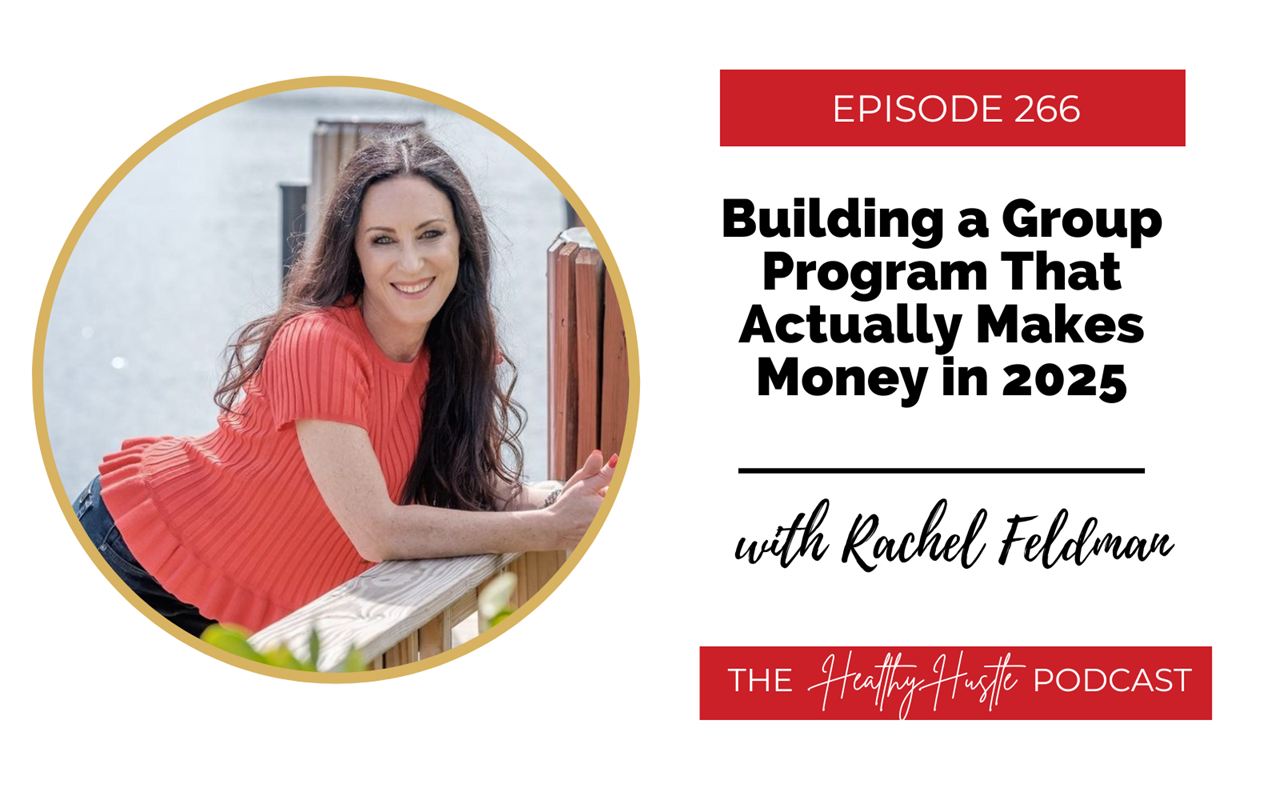The last two years have been hard on everyone. We all experience stress, overwhelm, disconnection, and some burnout, whether emotional, spiritual, physical, or all three. Maybe you’re still feeling these things as you move through life, raise your kids, or run your business.
Luckily, there are things you can do to create the space you need to heal and reduce the overwhelm you’re feeling. Sometimes it’s as simple as knowing when to pause, step back, and allow yourself to repair.
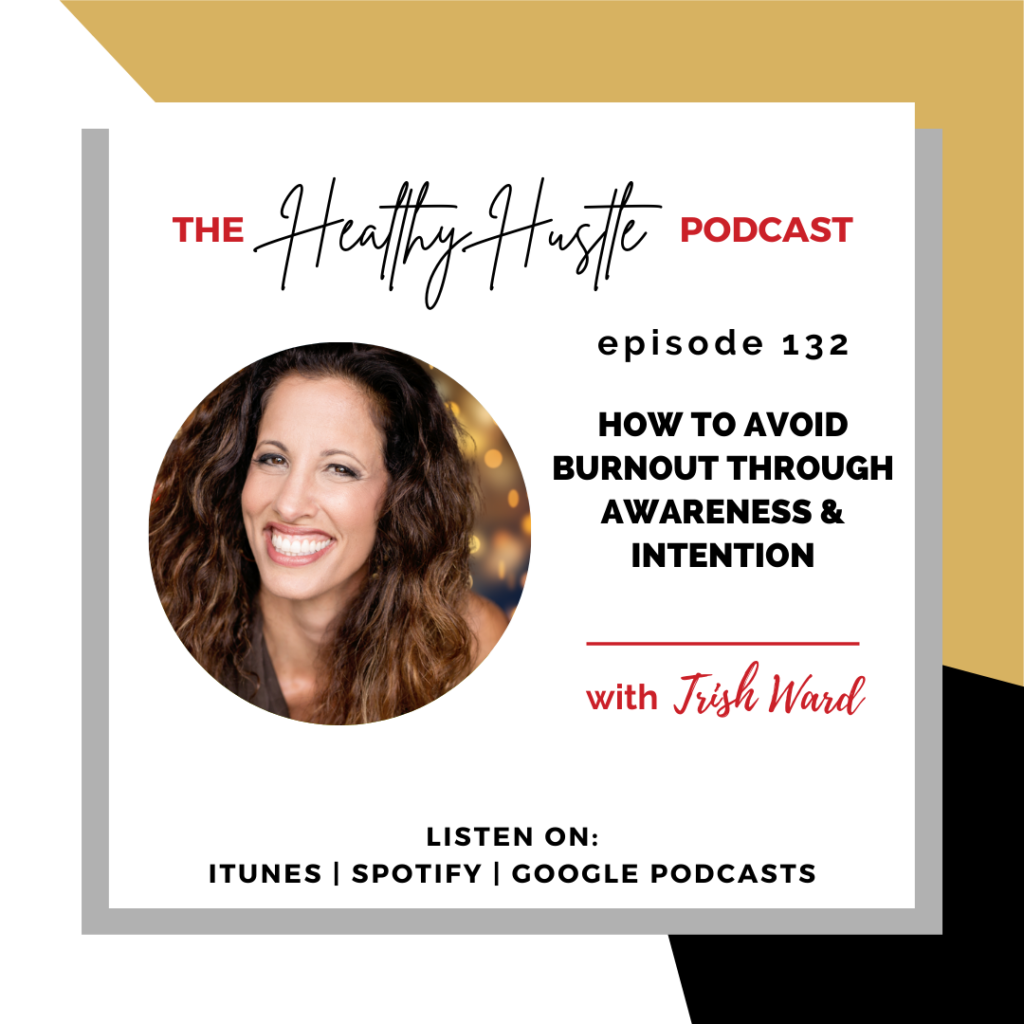
In today’s episode, I’m talking to Trish Ward, Body, Mind, & Soul Coach for ambitious women looking to transform their exhaustion, overwhelm, and burnout and love their lives again. Trish and I are having an open conversation about how stress and burnout affect your life, the importance of deep-diving into your darkness without feeling overwhelmed, and why awareness is everything when it comes to healing.
Connect with Trish:
Website: https://trishward.net/
Instagram: https://www.instagram.com/trishward2.0/
Rachel: Hey there, guys, I am beyond excited for this episode, I was just telling this amazing woman, Trish Ward, that I have been stalking her social media and taking it in with my heart and soul. Because she talks about stress burnout, she talks about that woman who is doing too much and is at the point where sometimes you just don’t even want to be showing up. So what I wanted is to have an open conversation and also speak to all of us who are building a business, mommy life, autoimmune, trying to make it in this world. So Trish, thank you for being here.
Trish: Thank you so much for having me, I am so excited to have this open and honest discussion with you.
Destigmatizing Stress & Burnout
Rachel: So let’s talk about stress and burnout. It’s not just these last two years where everyone’s like, I’m stressed, I’m burned out. But I think these last two years, what it has done is make it not so much of a stigma for somebody to come out and say, I’m burned out, this was really bad. And then share this realization of what they needed to let go of and become aware of, to actually get out of this constant up and down cycle of burnout.
Trish: Burnout. It really is a cycle of doing. We are constantly in a state of doing. I’ve experienced burn out twice. The first one wasn’t so bad. One was like a take down. And actually, it is what got me into my niche. Because I was like, I can’t even fake this anymore.
I am pretending I have this business that I love and all this stuff. Honestly, I was literally taking my kids to school, coming home, laying down for three hours, because it was enough just to take my kids to school, crawling to the shower, getting in the shower, seeing patients in the afternoon, and then getting back in bed.
That’s where I got the perception of like, oh, it’s restored, she’s on the summit, so that whole thing. I was totally disconnected. Not only just disconnected, but I was completely out of alignment. It wasn’t just that I was in the cycle of doing. I was in a total takedown spiritually, mentally, and emotionally because my work was my avoidance mechanism.
Why Healthcare & Wellness Professionals Experience Trauma
Rachel: We were talking about that just before we recorded. I’ve been through it. I think a lot of health and wellness professionals can identify with going through burnout because I do think that we’re emotionally tied to a lot of our stuff. And a lot of our stuff is why we also chose this profession.
So I think it’s safe to say that a lot of people have. Whether it’s an emotional burnout, spiritual burnout, physical or maybe all three happening at the same time, which I’ve had. Those burnouts where you take a step back, recover a little. This last burnout for me was it just had this one word on my forehead that I knew needed to be tackled and that was trauma. Because my overdoing had always been related to pushing things to the side that were extremely traumatic or triggering.
Trish: Yes, I can really relate to that. And I thank you for that. Honestly, I didn’t want to go into my trauma, I didn’t even actually want to be talking about trauma. Because while I’m trauma-informed, I’m not trauma licensed.
So I told myself a story about all of this. I’m laying in bed and I’m thinking, what is really going on here? I’ve got a real problem. My heart was doing weird stuff. All the physical symptoms are just what’s really bubbling underneath.
I was really coming into awareness that I am the paradigm shifter in my family. I have three children and some of the things that I experienced growing up will not go on anymore because of me. And I was having my Joan of Arc moment where the stake was going in the ground. I’m not doing this and this is not being passed on. Well, that’s a lot to hold with no model or no manual.
Paying Attention To The Spiritual, Mental, and Physical Symptoms Of Burnout
What I realized in those moments was that there was a definite place for talk therapy, but the body was missing for me. I couldn’t engage. So that’s part of disassociation. I couldn’t actually feel pleasure and good things in my life. But I also didn’t totally go to the extreme of pain. I just worked to just work more, and a lot of us do this.
Us healers and practitioners, we just keep educating ourselves, I’m gonna go get another certification, I’m gonna get X, I don’t know enough, and that story just kept playing over and over until it literally laid me flat out, and it does for a lot of people.
So I appreciate you recognizing my social media and what I really am trying to call out is that burnout, the physical symptoms of burnout, are the last things to show up. What’s underneath all that is that spiritual, mental, emotional stuff that we keep repressing.
I’m not saying that we have to every moment go into the depths of it. But the real issue is that we don’t create space in our daily lives to address certain things for many, many reasons. You said, We’re moms. Not everybody is that they have businesses or they have animals or aging parents. Hello, I can attest to that now, too. So we don’t create space.
And then it became the whole thing of, oh, self-care, and I started to really have an aversion to that word, because it was like, okay, no one and I don’t mean to put it down. But this is not a mani-pedi thing. This is, where do I create space in my life to hold the content with me?
But I think so much of that is based into self-worth, because I know those old stories. People always say to me, how can you not feel worthy? And I’m like, Well, I can tell you where this dates back to. I have so much knowledge from being in therapy and from doing things, EMDR and NET and RTM. All these different things that I’ve done, Shamans, everything. If you told me stick this up your butt and you’ll heal some traumatic thing, I was doing it with you.
Rachel: But I think the hard thing, and this is why I would love to hear from you is, how do we catch ourselves? Because life does come in, life is busy. I think when we’re at that burnout, we don’t even have the energy to then do that self-care. So I had to look at what were those old self-worth stories that still continue to play, and then how to catch myself. So I don’t go back there. Because we live in this world where we are showing up for our life and sometimes that can feel extremely overwhelming.
Trish: Absolutely. It can feel overwhelming. And it is. One of the things that I had to really come to terms what with was, whose story am I really living? I jokingly say this, but I was talking with a colleague about three weeks ago. So I’ve been doing functional medicine now for 15 years, and we were laughing because she’s an amazing naturopath. And I have loved my work. I’ve always felt though truly intuitively that it is a piece of my work. But I never really fully honored that. It was always, Oh, I’m just that person. I am one of many. But she and I were talking about how we had fallen into our professions actually, as a trauma response. That was how I got into functional medicine.
How To Bring Awareness To Yourself To Prevent Overwhelm
I had my second child who has special needs, and I fell into it literally. And I’m grateful for that. But there are many dimensions of ourselves that we have to bring awareness to. And in order to even just prevent overwhelm, which doesn’t lead to burnout.
It’s looking at number one, am I doing what feels good to me? How do we know what feels good? Well, we need to create space for that. It’s all these things we preach about, meditation and whatnot. I really go back to the body and that’s where Somatics comes in.
When we have trauma, it is hard for us to feel things because feelings can be scary and they can bring up stuff. Feelings are direct derivatives of emotion. So emotions that can feel really big. So I got really into the semantics of it just little things because I was one of those people. Even though I was talking about meditation, I really struggled with it. So I needed to do little things that would just pull me back into my body. Having the EFT really works for me. I know some people have a love hate with it, but it works. Just presencing myself so I could then feel and create some space. I mean 10 minutes, not long.
Rachel: I need to know I can do it at home. I think that’s not real. It’s not realistic for anyone. I think when we’re talking about this overwhelmed person, when I’m in such a state of overwhelm, I’m not seeing how easy it is to carve out that space because everything feels overwhelming.
I’m just talking about feeling overwhelmed during a launch. I had to really step back and be like, Rachel, how many times have you launched? This is just a feeling, but this feeling is going to cause my adrenaline to go and then all the sudden, burnout will be around the corner.
Trish: That’s right. And you actually hit on something really a key piece in my feeling and sharing that with others was the adrenaline piece of this, because everyone talks about cortisol. That gets a big play. But it wasn’t until I found Dr. Michael Platts, who works on adrenaline dominance, did I actually start to feel better. Because when we get the adrenaline going, we get the dopamine loop going, We keep our limbic system engaged. And I’m either in fight or flight, or I totally sway the addiction to that to that adrenaline, the addiction to feeling at that level.
That was me, I still have to catch myself many times. And this is new, too. Healing is not linear, it is cyclical. So as much as we can say, No, no, no, it is practice, practice, practice, creating space.
The overwhelm when I was laying in bed, and it was all I could do to shower, and halfway literally show up for people. It was okay. Today, I’m gonna get dressed, shower, and make dinner for everybody.
Why You Need A Personal Connection
And the key in all of this, truly the missing piece that society doesn’t talk a lot about is you need one personal connection. And yes, we have all been disconnected for the last few years. But even prior to that, when people are stressed and burning out, there is this misnomer that everyone has a best friend or everyone has this huge community. And being an entrepreneur can be really isolating and lonely. Who can you tell in your everyday life about what you’re really doing if you don’t have someone?
Rachel: I think that’s the part about showing up when you’re in this business is that you still have to show up. But who can you really be that transparent with and tell that this is going on? For that person who is addicted to the overdose, there’s so much shame and ego that has to do with that because I know there have been times I’m like, Should I hit post on this?
I actually posted last week, I didn’t want to do a Reel, I just felt overwhelmed for a few days. I just felt tired. And somebody messaged me and was like, are you okay? Is everything right? Because I said it passed and now I’m here doing this. But it still feels. When we share what’s really going on, people are like, poor you, when really they’re identifying with so much that’s actually happening.
Trish: That’s right. And we can get really in that black and white thinking or binary thinking and we identify with one or the other. When the reality is that’s where the perfectionist kicks in. And then the takedown of that archetype. Because I’m either doing really good or I’m failing. There was no one between.
The Reality & Spiritual Opportunity Of Burnout
That’s the hard part to get about being totally transparent, as a business owner, as someone who does need to keep showing up is writing this continuum. The real reality and the spiritual opportunity of burnout is that when you are flatlined, I don’t mean that as a trigger. But when you are just done, and I was done with a capital D. I wanted to unzip myself and step out. When you are done, on some level, whether it is not conscious yet, we are recalibrating and reevaluating our values and our priorities for us as adults.
We could go into Oh, we’re doing all of these things. The real reality is what is important today. It is down to one thing. It’s not the top three things. Those are all good things. But when you are flatlined, it’s one thing and then it is finding one person whether that is a coach, a mentor and or a friend that you can rely on to help hold space for you.
Not getting it out of our systems is how we all have the thyroid problems. Not getting it out of our systems is how we are just laying there. Sometimes it’s not going to be our spouse. It couldn’t be him for me because he had to pick up the slack in the family when I was just literally laying there.
When To Pause, Step Back, & Repair
Rachel: What would you say to that woman or man, where there isn’t a break in the day, because life is just going with work. They’re balancing, they’re doing this part-time. Would you say that there has to be this place where you pause and step back and repair?
Trish: Absolutely. Otherwise, the body will take it for you. I understand how busy we all are, especially with what’s going on and people have had to take on other jobs. There’s just a lot going on. But it’s five minutes, whether you’re driving home in the car, and you are actually going to commit to just having it be silent. Because that’s the other thing. We have all this information, which is we’re never in silence. We can never actually hear our own thoughts. We can never hear, Oh, I didn’t like it when my mom did that to me. I can sit with that. Not just because it’s not scary. It’s because we just don’t make the time this think about it.
Rachel: Well, I always say that’s what this blessing this last few years of going through that level of burnout, it was the first time that I had to ask for help. Yes, I had to sit with myself and have that time to really say, do I love what I’m doing? Do I love who I am? And really be confronted with some things that maybe were uncomfortable for me to hear.
Finding The Time You Didn’t Have When You Live With Intention
And then also have that time to sit back and say maybe I don’t know, right now. Maybe I just need to give space to see what comes up. But I knew that I couldn’t do that. I spent a lot of time repurposing social media posts, I spent a lot of time creating boundaries. Not working past four. When I was in deep burnout, I would work in the morning, I would close shop at 12. But what it did give me was the ability to realize how much time I really do have. Because I got so intentional with my work when I was sick that now I’m, wow, it’s all the time in the world.
Trish: You bring up the key point is that we tend to extend our days because we can until we are put up to the point where we physically can’t do it. For the listener hearing this and saying I just don’t have a minute, I challenge that. I do. Because your body will put you in the space where it’s like, hey, sister, you don’t have any time. And then you find it. It is all about the intention.
When we’re laying there and we feel we don’t have intention. That is the time when truly, journaling became my best way. It was my only outlet until my one friend Keith, who I always credit saved my soul a little bit.
Rachel: I love what you were saying right before we dove into this area is that we don’t sit and be quiet. When you were just saying I challenge you to see how much time you don’t have. Be honest on how much time you’re spending scrolling on Facebook or Instagram. That’s where I had to look at myself and say, I have no time. But if I really didn’t do some of these things that I’m doing in avoidance. Not that we don’t want to spend time on social media, but then there’s no quiet time.
Trish: Right? Back to that intention. I’m intentionally going to go to the sites that make me feel good. I’m going to intentionally support a few of my online friends and then I’m off. It’s creating but there’s so much to burnout. It’s so layered. It is about the boundaries. It’s about the patterns.
When we look at our lives through the archetype of seasons, society glorifies two seasons, spring and summer. Spring is where we’re planting all the ideas and in summer, it’s hard, right? We’re watering to have it all grow. We, especially as women, do not take in the reaps and reap our harvest. You don’t. We don’t really do that.
We definitely as a society don’t honor wintering, which is the releasing and the letting go and the serenity withi. Going within the darkness. And it is only until we hit the shadow that we actually truly evolve, right? That’s what’s being said anyway. In that darkness, when you are in that place where there is nowhere else to go. Then you sit with it. Then you sit with the parts that often felt uncomfortable. And somehow when you’re there, you can hear more clearly, it’s just being in a tunnel, all the senses become really intense.
So the time that we have, unfortunately, when we are in a struggle, once we can get through the physicalness of it in our minds, our minds just keep telling the story. Oh my god, I’m so tired. And that is truth. I’m not denying that that is truth. But once something happens and we stay somewhere long enough. We’re like, I’m sick of myself now. What am I doing? You can hear differently. And then it’s like, okay, what is it? Then we are up against our growth edges.
Oh, wow, there are some serious patterns that I’m seeing here, Trish, that I don’t necessarily want to see. But, I don’t have a choice. For me, it was definitely with my family of origin. A lot of other stuff comes up, and then we can then choose new values that work for us now. And that’s how we shift. But it’s not without being up against the edge.
How To Create Boundaries With Your Family
Rachel: I think family of origin for a lot of us can be it. I know I grew up with a lot of drama, a lot of things that happen and correlated with divorce, things that happen when your mom marries somebody that has some narcissistic tendencies, all that fun stuff. So what happens for that person who wants to create that boundary? But it’s getting that pushback from family of origin?
Trish: That’s a really great question. I will honestly say that initially, it is difficult because it’s a new territory that we’ve never been in. So it feels odd. However, I would say from experience, and we’re helping people work through this is the boundary, clearly stated, clearly owned, needs to be repeated and repeated and repeated.
But in order to state the boundary, we have to be firmly planted and be okay with where we are. Somehow it’s easier within business to hear oh, you’re gonna have haters, you’re gonna have people that just don’t like you, and whatever. When you have your family coming at you, where it’s just, oh that creates a rub there, that really doesn’t work for me and you’re thinking I’ve been dying for 40 years over here.
You hit a point where, and this is all nonviolent communication. I’m sorry you feel that way. I hear what you’re saying. Instead have acknowledgment that this is how it is for me. I was just telling someone the other day, that I used to split two-hour time limits, that was my max. Even then I wouldn’t usually even make it for all family stuff. We’d come to about an hour and a half. I told my husband, I tell the kids, this is all I have. Any overload that I was in, it was, thank you so much. I’m gone. Creating the boundary and being willing, number one, to have a support, it takes one person, just one person to support you. I’m going to keep repeating this until it feels comfortable. Because as we know, starting a new habit just doesn’t happen. Itt is that practice.
Advice For Those Unraveling Our Stress & Anxiety
Rachel: When we’re unraveling our stress and our anxiety and our overwhelm, what would you say for that person who is in the beginning stages? What would you say is your piece of advice?
Trish: That’s a great question. So it is the foundation. The foundation of good nutrition, trying to get a good sleep schedule, movement of some sort, just everyday foundation, right. But I would say the gap is where we want to jump into the either the mental, emotional or spiritual piece.
But we don’t actually have physical stamina for it yet. It’s showing up. Because we know we have to go deeper and there’s this gap piece. That’s where the somatic piece of it is huge. Creating the safety for our parasympathetic, calming down the limbic loop, calming us down to just stress. With these little exercises.
Stanley Rosenberg has the basics of exercise and I can share that with all of you. Anything that literally takes less than 60 seconds, but doing these exercises that pull us back into our body that create safety.
See that was the missing piece for me. I’m highly intellectual. We are all resourceful. But this gap was that I was not feeling it. There was this disconnect, of Whoa, all this intellect, and how do I actually integrate this? This isn’t really totally even reality, the body was the missing piece, the body keeps the score.
We have to retrain them the body so the body believes us. Otherwise, the body is just like, Yeah, whatever Trish, I’m going to just have a meltdown over here. Iif I were out of whack still, because you’re not listening to me.
Start By Creating Body Safety
Let’s create body safety, that would be number one. And so instead of jumping to very advanced practices of meditation, which I would love everyone to do, don’t start there. Start with these basic body exercises to create the safety to then be able to explore family patterns or boundaries.
The other piece I’ll share with you is just start to look at what you tolerate. You don’t need to change what you are tolerating. For me, one of the big pieces was, I had attracted some friends that weren’t really friends. That was a big piece of my energy sap. I was just over giving and there was no reciprocity. Again, I had learned not to receive that was something I learned. That wasn’t a good thing. And they had to learn how to receive.
But looking at what we tolerate, just means that we need to create space of: does this feel good? We tend, as a society, to jump into business. We’re always looking at our business instead of looking at the domain of connection, of partnership of spirituality, what is my connection to whatever higher realm you believe in my mental emotional states, all of these things? Start small and just look at what you’re tolerating. I have a checklist that will help people walk through that.
Rachel: What would you say to that woman who is in the stage that you’re in? She’s in that stage where she’s catching herself in some of thesebsystematic ways that they’ve always done things but are not working. What is the best advice you can give somebody who’s like, oh, yeah, I totally know what Trisha is mean, what she’s saying. I’m in these boundaries. I’m doing this, but she keeps falling back into these pitfalls.
Trish: That’s a beautiful question. First and foremost, allow yourself grace and forgiveness. Because again, healing is cyclical, it is not linear. The cells are always seeking homeostasis. So we want to go back to what we know, regardless if chaos is a stability factor for us, that comes into awareness.
So it is self forgiveness. Then, it really would be doing a body exercise to come back into reality. Is this true? This was a story in my head, it was keeping my cell safe because I was self sabotaging. The fear of being seen and the whole story that we go into, or that’s my story, and then creating safety.
Again, I’m really big on rituals. Journaling is probably my very favorite ritual. I’m able to get to the depths of me without anyone seeing. And then my truth comes out. Wherever you can get it out of the body. I love exercising too. Something that will actually chemically change your state will then help us come back into reality of okay. I can post this now. I can show up now. It’s little daily things. It’s bite-sized.
Years ago, when I was at Brendon Burchard, he sets his timer for every 50 minutes. He just stops and he has 10 minutes that he recalibrates. I’m not even asking for 10 minutes, but those moments, it is stopping the state. And it is changing the state and bringing awareness. Awareness is everything. It’s 80% of everything. Oh, there I go again, down the slippery slope of the story. That’s not true.
Exercises She Took To Propel Herself Out Of Overwhelm
Rachel: We talked about your own journey. When did you have that moment, that shift where you’re like, Okay, I’m sick of being this way. What was the exercises? Or what did you do at that time to propel you to this next place that you’re in?
Trish: Gosh, let me tell you. I crawled out of this second burnout, it took me five years. I want to give people a lot of hope. It doesn’t always have to take that long. But I was doing it on all levels. My struggle really was just, I was the traditional case of, my thyroid blew out. I was staring at a body with an extra 40 pounds on it. Who is this person? My sleep was all crazy and whatnot.
I have a dear friend Allison, who kept saying maybe you’re just supposed to love the body you’re in. And that was just such a foreign concept to me, because I was such a driver. I was an athlete. I come from a family where you just work hard, and you got to look the part. So when I finally got to this place of surrender, I really started building a relationship with all the different versions of myself.
Once I did that, and then I cleaned up my liver. It was amazing what transformed, but give myself the grace of slowness. It was slowing down. Really what I had to explore was my skin, this new version of myself having been completely laid out what actually does success look like? I once thought it was something very different.
Now, it is all about being able to identify with that completely. Because once you take the addiction away, you have to be so real with your emotions, and so raw, and you need the capacity to do that. You need space. Because if you’re not going to feed into the addiction of the overworking and the overdoing, then you have to be like, what am I feeling right now? What is the emotion that’s coming up? And working through all the in-betweens. Is it tied back to my core system? Is this happening? Because this is something new? What is my worth?
Now, if I’m not overdoing all of those things that come with challenging old ways. A lot of people find themselves –at least the people that find me now– are mid-lifers that are like, what’s the meaning of my life now? Because we’ve been there, done that, chasing this whole thing.
We’ve done well, there was a cost. There’s a cost to that. Because it was like, wow, I was living in patterns that I thought actually were keeping me safe at the time. So there’s grace for that. But when the awareness and consciousness to who I really am now, who I’m designed to be, in this collective time, through all of that we have all been through. Now, am I in alignment with that?
Owning Up To The Real Truth
Well, it takes that slowing down in the real reality of how do I define success? How do I define love? How do I love myself? Do I love myself? I had to go to the parts of who I don’t like, that part of myself. That’s the ego and the healing cannot exist in the same place.
Rachel: That is 100% true.
Trish: That is a sacred wheel that we are on, that takes time and awareness. Honestly, again, I go back to the one person. I hope it’s more. Sometimes in my burnout, it did not feel more. On the outside, it looked like I had all these connections and truly on the inside, we have an epidemic of loneliness. I was deeply lonely, but I was yearning for honesty and transparency in my own life. I call it the TRT: The Real Truth.
What is your real truth? My real truth is I have some sticky relationships that I need to look at, or I don’t want for me. I know you speak a lot about this in your Facebook groups. But I thought I wanted something going into being in functional medicine, and then coaching and all that. I wanted to be a bigger person with a bigger platform. I can honestly say now, after being a part of that, I just want to truly help heal one person. And as that grows I don’t need this magnificent thing that society tells us we need that’s how we arrive that that’s just not for me anymore.
Rachel: That is that. I’m saying oh, because we all have these realizations. I know in the last few years. I’ve heard people have these big aha realizations. That’s the beauty of when we go through things now and we can be transparent about it. There’s such an opportunity to grow and be transparent more with ourselves really honest about where that burnout is stopping us from living potentially the life that we really want. Not what we think we want.
Trish: Yes. One thing I want to add when you had said, what do you tell someone who’s right in the middle of it right now? Because I know that eating right and movement and all that it just seems too much. I said, it was just down to the shower, that was good.
There was something about what I’m going to offer for you guys. When we are wintering, there are some reflection questions that we can ask with just sitting and being there. Once we release our wanting to control that feeling of it should be irritating. I really should go for a walk. We’re creating stress, when we do that literally, very physically, physiologically, when we can calm that down, so much more can percolate in the surface that actually heals that whole amygdala hijack. That keeps us in that whole spin. So it is if it is too much to do the foundations. That’s where I go to journaling and I’ll offer those reflection questions to you guys.
Rachel: Thank you so much for being here today. This was amazing. I think your work is so needed always. But I feel now people are so they understand how stress and burnout affects your life and I think people are a little more open to deep diving into their darkness without feeling overwhelmed.
Trish: Yes. Oh gosh, thank you so much. What a pleasure to just be with you.
Rachel: Trish, before we leave can you tell everyone where they can find you?
Trish: Absolutely. Find me on Instagram at Trishward 2.0 and on I changed it up there and on Facebook same thing.
Rachel: And then your site is TrishaWard.net. Guys that will definitely be in the show notes as well as the gift. If you have any questions for Trish, please reach out to her and follow her Instagram. It’s really amazing content. I don’t know if I’ve ever checked you out on Facebook but I love the reels. I just love the quiet of Instagram even though there are reels and all of that. Sometimes they have it just on no voice and then I but I always put it for you on voice. Make sure you follow this lady. She will help you, trust me. If you need to hire her you know where to find her. All right guys. Have a beautiful one and we will see you later.


